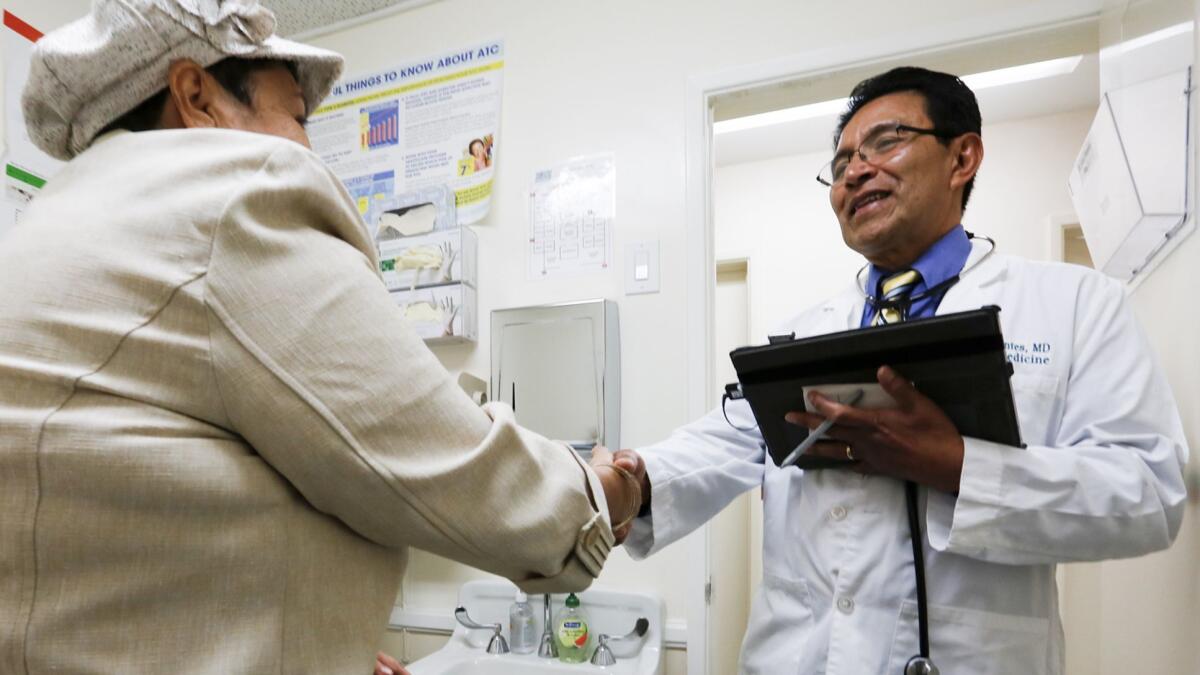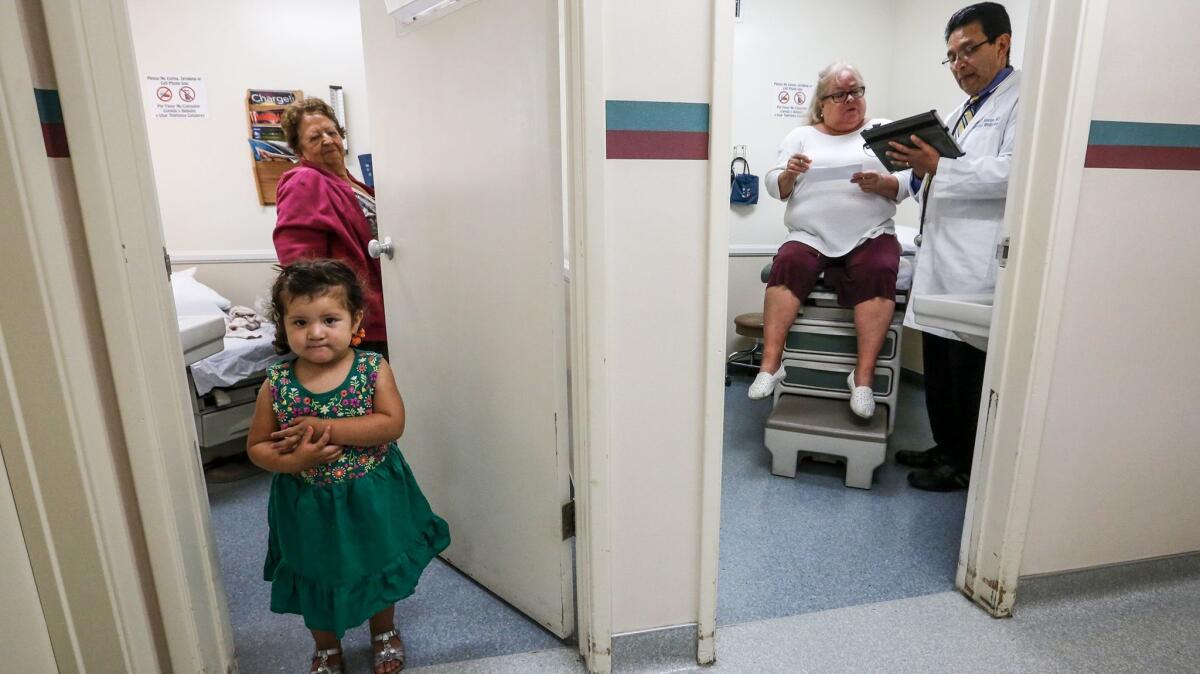Column: ‘Everyone I know is worried.’ Terrified patients await fate of their healthcare

His private practice has changed over the years but Dr Juan Montes still believes in providing good personal care to his patients.
- Share via
Dr. Juan Z. Montes recalls the surge of people who came calling, beginning about two years ago.
“We couldn’t handle them all,” he said, referring to the new patients who visited his four Southern California clinics after they got health insurance under the Affordable Care Act.
Montes, 67, who’s been doctoring in L.A. for four decades, estimated that his patient load increased about 20%.
Many of his clients had gone years without insurance and couldn’t afford to pay for doctor visits out of their own pockets, so their medical issues had become more advanced.
Montes told me about a man in his 50s who had “a mass the size of an orange” on the left side of his neck.

It turned out to be cancer. The man also had hypertension and was pre-diabetic.
Montes sent him to a specialist for the tumor, and the patient is now cancer-free. His other medical problems have been stabilized.
I visited Montes on Thursday at his Inglewood clinic, which opened in 1982.
In the early days, he said, most of his patients had private insurance coverage through their employers — many of them airport-related companies. Now, the bulk of his clients are on Medi-Cal or covered by a combination of Medi-Cal and Medicare.
If the healthcare reform bill backed by President Trump and approved by the House were to become law, a lot of these people could get hammered.
‘Everyone I know is worried’
“I’m very scared,” said Sandra Gonzalez, 60, who works as a painter in her husband’s small construction business.
Gonzalez, who visited the clinic because her arthritis was flaring, got Medi-Cal coverage about two years ago after being without insurance for years. Her husband has Medi-Cal too, and she’s worried for him. He’s losing his sight because of his diabetes.
“I don’t know what we would do if we lost insurance,” Gonzalez said. “Everyone I know is worried. Families with children, seniors, everyone.”
Another Montes patient, retired truck driver Jesus Villalobos, has Medicare and Medi-Cal. He’s had two knee replacements and two shoulder surgeries, and came in for some blood work.
“Trump is doing this,” Villalobos suggested, because the president has never experienced the hardships of working folks. “If he was in our shoes, he’d understand and he wouldn’t try to take things away.”
To be clear, we don’t know what will happen with healthcare reform, because the Senate hasn’t had a chance to put a stethoscope and a scalpel to the current package.

What we do know is that the House plan, for which Trump took a bow, tramples the promise that was central to his campaign — cheaper, better healthcare for all.
“It was laughable,” Montes said. “There’s no way you can cover everybody and have a less expensive system.”
Bad medicine
Last week, the Congressional Budget Office said the House plan would leave 23 million people without insurance over the next decade, raise deductibles and lower coverage for some. It would hit many older, sicker, poorer people particularly hard, and ding Medicaid despite Trump’s promise to leave that program alone. Meanwhile, there’d be tax advantages for the wealthy.
Obamacare had its own miseries, and the former president was either uninformed or not leveling with the public when he said families would see cuts in premiums and that no one who liked their plan would be forced to switch.
But the costs to some helped finance benefits for millions who previously were uninsured.
In California alone, federal funds helped add 3.8 million people to an expansion of Medi-Cal. If that’s scaled back, the state could pay to keep that coverage in place, but that would mean deep cuts elsewhere.
“My hope is that they try to improve it rather than completely getting rid of it,” Montes said of Obamacare.
His was not the only negative review I heard as I checked in with doctors I’ve written about in the past — and with Jim Cook, whose Antelope Valley Community Clinic was featured in a March story by my colleague Soumya Karlamangla.
“Mr. Trump said, ‘No one knew how complicated healthcare is.’ Actually … those that have spent 20 to 30 years-plus providing healthcare know all too well how complicated the system is,” said Cook, who founded the clinic, which sees 500 patients daily. “The House plan is more about impugning President Obama than reforming healthcare.”
Dr. Jonathan LoPresti, the L.A. County-USC Medical Center doctor I profiled in March, sent me a long analysis of the current “reform.”
There could be “an additional burden on the taxpayer,” he said, if uninsured patients with advanced illnesses flock in greater numbers to safety-net public hospitals thanks to the lack of regular care. There will be a cost as well, he said, for insured patients who would pay less but get less healthcare under the plan and face higher deductibles.
“Patients will not go to the doctor for routine healthcare visits because out-of-pocket costs will be prohibitive. So … I see patients presenting to the ER for treatment of common medical conditions, as well as with advanced stages of preventable disease,” LoPresti said.
Dr. Gene Dorio, a Santa Clarita house-call MD I’ve written about, echoed that thought, saying hospitals will eat the cost of uninsured people visiting ERs.
“A decade ago, this forced many hospitals into bankruptcy,” Dorio said. “I believe Trumpcare will do the same thing.”
When Montes had finished his morning appointments with a dozen patients, I asked how he got into medicine.
He said he was born in Mexico to an American-born mother and a Mexican father who frequently traveled to the U.S. in the bracero program. The family moved north when Montes was 6, and both parents worked in the citrus industry in Santa Paula while raising five kids. All five became professionals, including three doctors.
Montes got an engineering degree at UCLA but decided he’d rather serve poor communities as a doctor. He got into Harvard medical school and did his residency at UCLA. He and his brother Alejandro, a pediatrician, opened the first of their four local clinics in 1981.
He said he got to talking to a patient last week about whether healthcare ought to be viewed as a right or a privilege.
Montes argued that it’s unhealthy for people to stress about not having routine, basic care because they can’t afford it.
“The gentleman said, ‘You know, I think we all need to pay something,’” Montes said. “I think we all do pay. If we don’t get the services, we’re paying with our pain and suffering.”
To read the article in Spanish, click here
Get more of Steve Lopez’s work and follow him on Twitter @LATstevelopez
ALSO
Die hard: Republican healthcare bill has no problem throwing you off a building
The challenges in setting up a California single-payer system are daunting — but not insurmountable
Analysis says 23 million more people would be uninsured by 2026 under GOP healthcare bill
More to Read
Sign up for Essential California
The most important California stories and recommendations in your inbox every morning.
You may occasionally receive promotional content from the Los Angeles Times.














